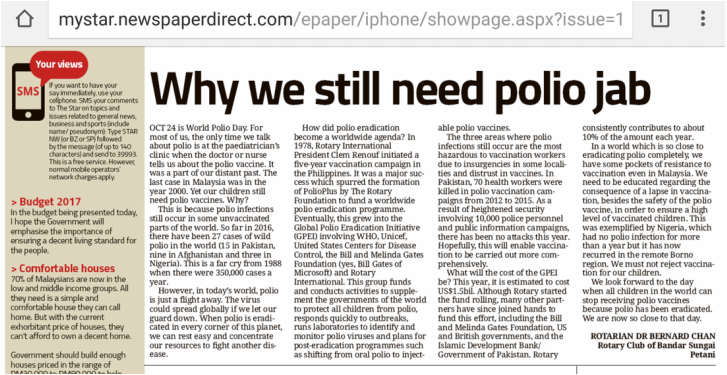This is because polio infections still occur in some unvaccinated parts of the world. So far in 2016, there have been 27 cases of wild polio in the world (15 in Pakistan, nine in Afghanistan and three in Nigeria). This is a far cry from 1988 when there were 350,000 cases a year.
However, in today’s world, polio is just a flight away. The virus could spread globally if we let our guard down. When polio is eradicated in every corner of this planet, we can rest easy and concentrate our resources to fight another disease.
How did polio eradication become a worldwide agenda? In 1978, Rotary International President Clem Renouf initiated a five-year vaccination campaign in the Philippines. It was a major success which spurred the formation of PolioPlus by The Rotary Foundation to fund a worldwide polio eradication programme. Eventually, this grew into the Global Polio Eradication Initiative (GPEI) involving WHO, Unicef, United States Centers for Disease Control, the Bill and Melinda Gates Foundation (yes, Bill Gates of Microsoft) and Rotary International. This group funds and conducts activities to supplement the governments of the world to protect all children from polio, responds quickly to outbreaks, runs laboratories to identify and monitor polio viruses and plans for post-eradication programmes such as shifting from oral polio to injectable polio vaccines.
The three areas where polio infections still occur are the most hazardous to vaccination workers due to insurgencies in some localities and distrust in vaccines. In Pakistan, 70 health workers were killed in polio vaccination campaigns from 2012 to 2015. As a result of heightened security involving 10,000 police personnel and public information campaigns, there has been no attacks this year. Hopefully, this will enable vaccination to be carried out more comprehensively.
What will the cost of the GPEI be? This year, it is estimated to cost US$1.5bil. Although Rotary started the fund rolling, many other partners have since joined hands to fund this effort, including the Bill and Melinda Gates Foundation, US and British governments, and the Islamic Development Bank/Government of Pakistan. Rotary consistently contributes to about 10% of the amount each year.
In a world which is so close to eradicating polio completely, we have some pockets of resistance to vaccination even in Malaysia. We need to be educated regarding the consequence of a lapse in vaccination, besides the safety of the polio vaccine, in order to ensure a high level of vaccinated children. This was exemplified by Nigeria, which had no polio infection for more than a year but it has now recurred in the remote Borno region. We must not reject vaccination for our children.
We look forward to the day when all children in the world can stop receiving polio vaccines because polio has been eradicated. We are now so close to that day.
ROTARIAN DR BERNARD CHAN
Rotary Club of Bandar Sungai Petani


 RSS Feed
RSS Feed




